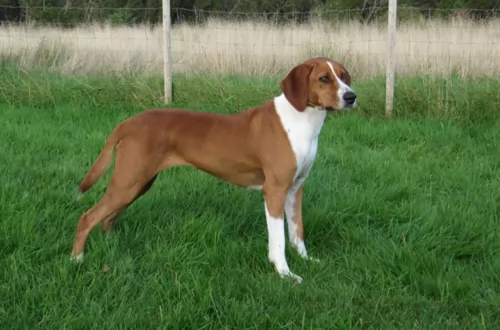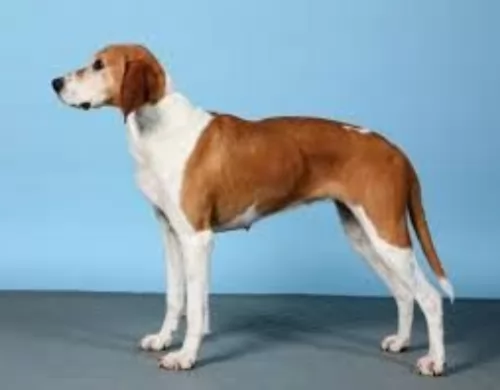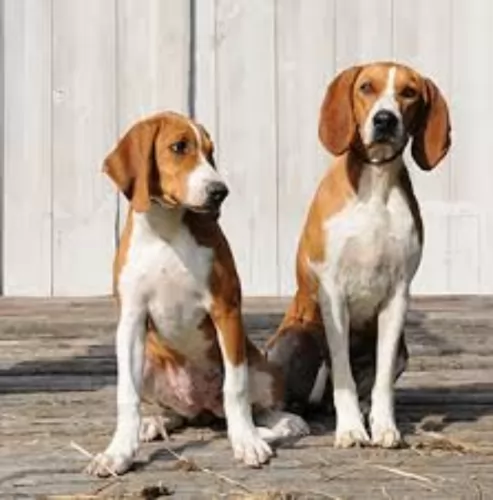 Petzlover
Petzlover Great Pyrenees is originated from France but Hygenhund is originated from Norway. Great Pyrenees may grow 21 cm / 9 inches higher than Hygenhund. Great Pyrenees may weigh 29 kg / 64 pounds more than Hygenhund. Great Pyrenees may live 3 years less than Hygenhund. Great Pyrenees may have more litter size than Hygenhund. Both Great Pyrenees and Hygenhund requires Moderate Maintenance.
Great Pyrenees is originated from France but Hygenhund is originated from Norway. Great Pyrenees may grow 21 cm / 9 inches higher than Hygenhund. Great Pyrenees may weigh 29 kg / 64 pounds more than Hygenhund. Great Pyrenees may live 3 years less than Hygenhund. Great Pyrenees may have more litter size than Hygenhund. Both Great Pyrenees and Hygenhund requires Moderate Maintenance.
 The Great Pyrenees could be from Spain or France because the dog hails from the Pyrenees Mountains, which spans both France and Spain.
The Great Pyrenees could be from Spain or France because the dog hails from the Pyrenees Mountains, which spans both France and Spain.
The dog was used to defend flocks from predators but its lineage goes a long way back, thousands of years in fact. It is thought that they only arrived in Europe about 5,000 years ago. The dog was adopted into the court of Louis the XIV as a royal dog.
During the mid 1600s, the dog's numbers dwindled but the French developed kennel clubs where the dog could be bred and its numbers restored. It was in 1933 that the Great Pyrenees received American Kennel Club recognition.
 The Hygenhund is a hound from Norway that was developed in the early 1800’s by the Norwegian breeder Hygen. It was developed for hunting small game such as fox, rabbit, hare or racoon. It is known for its endurance and ability to survive travel across vast artic land without fatigue. It was developed by crossing several Norwegian hounds with ones from England and Germany. This includes basset hounds, holsteiner hounds, beagles, Bloodhounds, Scandinavian hounds and English Pointers. The resulting Hygehound is a scent hound whose popularity fell in the 20th century. Most of the remaining dogs today are located in Norway. The Norwegian Kennel Club and the UKC have both recognized the breed yet its numbers remain low. Even at that the breed today remains a great hunting dog but it is also a great companion or family dog.
The Hygenhund is a hound from Norway that was developed in the early 1800’s by the Norwegian breeder Hygen. It was developed for hunting small game such as fox, rabbit, hare or racoon. It is known for its endurance and ability to survive travel across vast artic land without fatigue. It was developed by crossing several Norwegian hounds with ones from England and Germany. This includes basset hounds, holsteiner hounds, beagles, Bloodhounds, Scandinavian hounds and English Pointers. The resulting Hygehound is a scent hound whose popularity fell in the 20th century. Most of the remaining dogs today are located in Norway. The Norwegian Kennel Club and the UKC have both recognized the breed yet its numbers remain low. Even at that the breed today remains a great hunting dog but it is also a great companion or family dog.
 This is a beautiful dog, noticeable by the essentially white coat and his overall size, standing at 70 to 82cm and weighing between 40 to 54 kg.
This is a beautiful dog, noticeable by the essentially white coat and his overall size, standing at 70 to 82cm and weighing between 40 to 54 kg.
The double coat is medium to long, coarse and straight or wavy and and it can be solid white, cream or white with patches of light tan or grey.
The nose is black, the eyes brown, the ears of medium length and floppy and the tail long and plumed.
The Great Pyrenees is an intelligent, strong willed dog with a mind of his own so he will be able to be trained and socialized successfully.
His huge size will require that he be trained because when he is indoors he can knock things over and he must be able to respond to you telling him to lie down.
As a large dog, he isn’t suited for tiny homes, as he requires lots of space even though he doesn’t require a lot of exercise. Not only that, he takes his watchdog duties seriously and he is inclined to bark a lot, and in a small place, you’ll be getting constant complaints from the neighbors.
When trained and socialized, your big dog is social, active and loving. He gets on well with children, the elderly and with pets in the home. He isn’t that overly active and will happily make himself at home on your couch and bed.
 The Hygenhund has a solid rectangular and compact body with muscular and compact legs and paws. Their heads are shaped like a triangle with dark eyes and a broad skull. The muzzle and neck are long and the topline is even. They carry their tail high, but they do not curl it over their back. They are a medium sized dog with short hair. They have an overabundance of energy and get bored easily. They can come in black with chestnut or white markings, yellow and red, chestnut without or with black markings.
The Hygenhund has a solid rectangular and compact body with muscular and compact legs and paws. Their heads are shaped like a triangle with dark eyes and a broad skull. The muzzle and neck are long and the topline is even. They carry their tail high, but they do not curl it over their back. They are a medium sized dog with short hair. They have an overabundance of energy and get bored easily. They can come in black with chestnut or white markings, yellow and red, chestnut without or with black markings.
 The Great Pyrenees is such a calm, independent, serious, well-mannered dog who loves to be around his human family and to please them. He is gentle and knows how to behave well around children, the elderly as well as with any pets in the home.
The Great Pyrenees is such a calm, independent, serious, well-mannered dog who loves to be around his human family and to please them. He is gentle and knows how to behave well around children, the elderly as well as with any pets in the home.
He makes a wonderful companion and although he loves indoor life as much as outdoor life, he is much happier settling into life in the country or the suburbs as opposed to life in the city and a tiny property.
Give your big white coated pet all the love he thrives on, and you'll enjoy a wonderful relationship with this large, amicable dog.
 1. Children friendliness – The Hygenhund is very friendly to children and love to play with them.
1. Children friendliness – The Hygenhund is very friendly to children and love to play with them.
Stamina, intelligence and ability to endure cold climates.
Very adaptable in some ways – enduring cold climates for instance. However, they need a large yard or area to run in. They are not as adaptable in an apartment.
The Hygenhund is very intelligent and a quick learner. They love learning new things.
 Your Great Pyrenees is a big dog with an average lifespan of 10 to 12 years. His large size means you will need to look out for typical 'big dog' ailments such as hip dysplasia.
Your Great Pyrenees is a big dog with an average lifespan of 10 to 12 years. His large size means you will need to look out for typical 'big dog' ailments such as hip dysplasia.
This problem can cause your pet to be in pain and he can also become lame, battling to walk and play and battling to get up after lying down.
Also, look out for bone cancer with your pet and as mentioned previously, bloat, which is a life threatening disease where the stomach of the dog swells up.
 Your Great Pyrenees isn't going to be a dog leaping around you demanding a game or walk like what you get from some energetic dogs. He certainly doesn't require strenuous exercise but will require a nice, brisk walk every day. Give him some ball or rope games too. He's territorial and likes large grounds to walk around and guard and this constant guarding is a good form of exercise too.
Your Great Pyrenees isn't going to be a dog leaping around you demanding a game or walk like what you get from some energetic dogs. He certainly doesn't require strenuous exercise but will require a nice, brisk walk every day. Give him some ball or rope games too. He's territorial and likes large grounds to walk around and guard and this constant guarding is a good form of exercise too.
With two layers, the coat of the Great Pyrenees will need to be brushed twice a week to prevent burrs attaching to the fur and to prevent it from matting, It also gets rid of loose hair during shedding.
He tends to drool so it's handy keeping a damp cloth close by just to give his face area a wipe down. Your dog's ears will need to be cleaned with special ear-cleaning lotion and his nails will also need to be trimmed.
Socialize your Great Pyrenees with other dogs and people from a young age. Without proper socialization, this breed can become territorial and possessive of his family, which could lead to aggression. He bonds with his family but tends to be wary of strangers.
It is far better to feed your Great Pyrenees smaller meals throughout the day as opposed to 2 large meals a day. A large dog like him can develop bloat from gulping down a large amount of food too quickly.
If you feed your Great Pyrenees commercially manufactured food, make sure it is high in omega 3 and 6 to keep his thick white coat luxurious.
Your dog will need a dog food targeted at a large breed. Remember to include some raw meat as well as cooked chicken, vegetables and brown rice into his kibble and always ensure fresh, cool water is available.
 Since the Hygenhund is such a high energy working dog feed a high quality food. Feed 3-4 times a day for a total of 2.3 cups.
Since the Hygenhund is such a high energy working dog feed a high quality food. Feed 3-4 times a day for a total of 2.3 cups.
Again this is a high energy dog. Feed a high protein good quality dog food twice a day for a total of 3-4 cups.
Good speed and stamina. Good in cold climates.
The Hygenhund needs plenty of exercise to dissipate all its working energy. They will excel at field trials, lure coursing, fly ball, tracking, and agility.